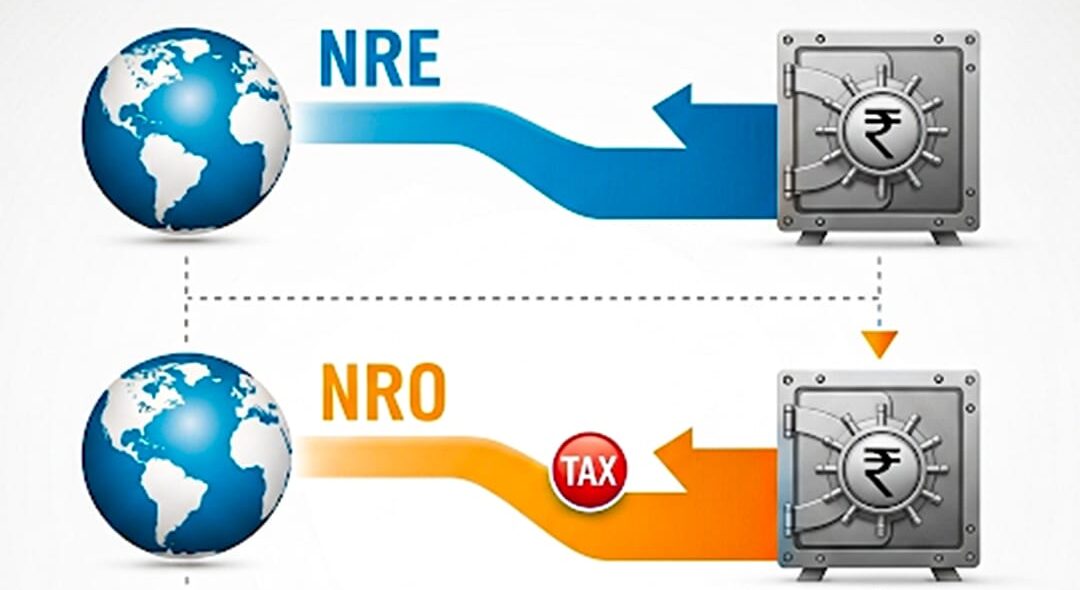For NRIs living in the U.S., managing finances between two countries can be complex. Whether you’re sending money home, maintaining investments, or earning income in India, choosing the right bank account is crucial. NRE, NRO, and FCNR accounts serve different purposes – and making the right choice can impact everything from taxes to repatriation.
This guide breaks down the key differences, use cases, and advantages of each account type to help you make informed decisions.
What is an NRE Account? (Non-Resident External Account)
Definition and Purpose
An NRE account is a rupee-denominated account used to park your foreign earnings in India. It’s primarily for NRIs who wish to send money home and repatriate funds without tax complications.
Key Features
- Tax-free interest income in India
- Full repatriability of both principal and interest
- Funds are converted to INR, exposing them to currency fluctuation risks
- Available as savings, current, or fixed deposit accounts
Best Use Case
Perfect for NRIs who earn abroad (e.g., in USD) and want to:
- Send money to India
- Invest in India
- Repatriate funds back to their overseas accounts
What is an NRO Account? (Non-Resident Ordinary Account)
Definition and Purpose
An NRO account is for managing income earned within India, such as rent, dividends, pension, or capital gains.
Key Features
- Can hold Indian income only
- Interest is taxable in India (TDS at ~30% before deductions)
- Partial repatriation allowed — up to $1 million per financial year, post-tax
- Joint accounts with resident Indians allowed
Best Use Case
Ideal for NRIs who:
- Have financial ties in India (e.g., property rental, investments)
- Need to pay local bills or manage Indian expenses
What is an FCNR Account? (Foreign Currency Non-Resident Account)
Definition and Purpose
FCNR accounts allow NRIs to hold fixed deposits in foreign currency in Indian banks, eliminating conversion risk.
Key Features
- Maintains deposits in USD, GBP, EUR, JPY, etc.
- Tax-free interest in India
- Fully repatriable both interest and principal
- Typically offered as fixed deposits (1–5 years)
Best Use Case
Best for NRIs who:
- Want to avoid exchange rate risk
- Prefer to retain savings in foreign currency
- Are you looking for safe investment options with tax benefits in India
Key Differences Between NRE, NRO, and FCNR Accounts
Feature | NRE Account | NRO Account | FCNR Account |
Currency | INR | INR | Foreign currency |
| Income Source | Overseas income | Indian income | Overseas income |
| Interest Taxation | Tax-free in India | Taxable in India (TDS) | Tax-free in India |
| Repatriability | Full | Up to $1 million/year post-tax | Full |
| Best For | Sending money to India | Managing income in India | Preserving foreign currency value |
Choosing the Right Account for Your Needs
When to Choose an NRE Account
- Your income is primarily from the U.S.
- You want to send money to India regularly
- Tax-free interest and repatriation are important
When to Choose an NRO Account
- You earn rental, dividend, or pension income in India
- You want to pay utility bills or support family in India
- You’re okay with limited repatriation
When to Choose an FCNR Account
- You want to avoid currency risk
- You prefer to earn interest on USD/foreign currency
- You want a secure, tax-free foreign currency deposit option in India
Other Considerations for US-Based NRIs
Currency Exchange Risks
- NRE/NRO accounts are exposed to INR fluctuation.
- FCNR accounts shield your funds from conversion losses.
Documentation and KYC
To open any of these accounts from the U.S., you typically need:
- Proof of NRI status (valid visa, work permit)
- Passport with visa pages
- Overseas address proof
- PAN card (especially for NRO accounts)
Banking Fees and Charges
- Account maintenance charges vary by bank
- Currency conversion fees may apply for NRE
- Tax filing obligations are more involved for NRO accounts
Advantages and Disadvantages
NRE Account
✅ Pros:
- No tax on interest
- Full repatriability
- Simple for inward remittances
❌ Cons:
- Not suited for Indian income
- Exchange rate risk
NRO Account
✅ Pros:
- Useful for managing Indian income
- Can be operated jointly with a resident Indian
❌ Cons:
- Interest taxed at ~30% (before deductions)
- Repatriation is limited and post-tax
FCNR Account
✅ Pros:
- No currency conversion required
- Tax-free interest
- Ideal for long-term savings in USD or other currency
❌ Cons:
- Fixed deposits only (no savings option)
- Not ideal if you need to spend in INR
How to Open NRE, NRO, and FCNR Accounts from the U.S.
Step-by-Step Process
- Choose a bank that offers NRI banking (e.g., ICICI, HDFC, SBI, Axis)
- Fill out the account opening form online or download it
- Provide the required KYC documents
- Notarize or attest documents via the Indian Embassy/Notary
- Courier them to the bank’s NRI branch or open via video KYC (available with some banks)
Online Banking Facilities
Most Indian banks offer full-featured online banking, including:
- Mobile app access
- Fund transfers
- Fixed deposit creation
- Tax statements download
Conclusion
Understanding the differences between NRE, NRO, and FCNR accounts empowers you to manage your money across borders more effectively. Each serves a unique purpose — from sending money to India tax-free to safeguarding your foreign currency earnings.
- NRE is best for repatriable foreign income
- NRO is suited for managing Indian income
- FCNR helps preserve foreign currency value with tax-free growth
Before opening an account, evaluate your income sources, remittance needs, and repatriation goals. Consult with your bank or a financial advisor to determine the best fit for your financial journey as a US-based NRI.
FAQs
Q1. What is the main difference between NRE and NRO accounts?
NRE is for foreign income and is tax-free; NRO is for Indian income and is taxable.
Q2. Can I open both an NRE and an NRO account?
Yes, many NRIs maintain both to manage different types of income.
Q3. Are FCNR accounts a good option for NRIs with US dollar income?
Yes, FCNR protects against currency risk and offers tax-free interest in India.
Q4. What are the tax implications of NRO accounts in India?
Interest earned is subject to TDS (typically 30%), though deductions can apply.
Q5. Can I repatriate funds from my NRO account to the US?
Yes, up to $1 million per financial year after paying applicable taxes.


